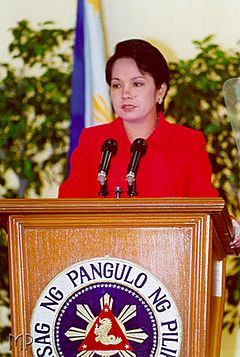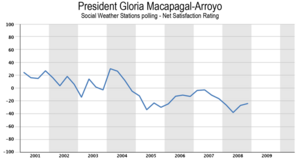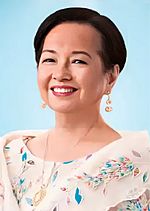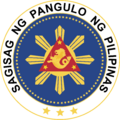Gloria Macapagal Arroyo facts for kids
Quick facts for kids
Gloria Macapagal Arroyo
|
|
|---|---|
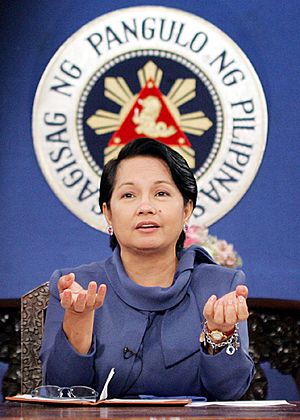
Arroyo in 2006
|
|
| 14th President of the Philippines | |
| In office January 20, 2001 – June 30, 2010 |
|
| Vice President |
|
| Preceded by | Joseph Estrada |
| Succeeded by | Benigno Aquino III |
| 10th Vice President of the Philippines | |
| In office June 30, 1998 – January 20, 2001 |
|
| President | Joseph Estrada |
| Preceded by | Joseph Estrada |
| Succeeded by | Teofisto Guingona Jr. |
| 21st Speaker of the House of Representatives of the Philippines | |
| In office July 23, 2018 – June 30, 2019 |
|
| Preceded by | Pantaleon Alvarez |
| Succeeded by | Alan Peter Cayetano |
| Secretary of National Defense | |
| Officer in Charge November 30, 2006 – February 1, 2007 |
|
| President | Herself |
| Preceded by | Avelino Cruz |
| Succeeded by | Hermogenes Ebdane |
| Acting September 1, 2003 – October 2, 2003 |
|
| President | Herself |
| Preceded by | Angelo Reyes |
| Succeeded by | Eduardo Ermita |
| 21st Secretary of Social Welfare and Development | |
| In office June 30, 1998 – October 12, 2000 |
|
| President | Joseph Estrada |
| Preceded by | Lilian Laigo |
| Succeeded by | Dulce Saguisag |
| Senator of the Philippines | |
| In office June 30, 1992 – June 30, 1998 |
|
| Senior Deputy Speaker of the House of Representatives of the Philippines | |
| In office July 25, 2022 – May 17, 2023 Serving with several others
|
|
| House Speaker | Martin Romualdez |
| Succeeded by | Aurelio Gonzales Jr. |
| In office August 15, 2016 – March 15, 2017 Serving with several others
|
|
| House Speaker | Pantaleon Alvarez |
| Preceded by | Roberto Puno |
| Succeeded by | Linabelle Villarica |
| Deputy Speaker of the House of Representatives of the Philippines | |
| In office May 17, 2023 – November 7, 2023 Serving with several others
|
|
| Preceded by | Aurelio Gonzales Jr. |
| Succeeded by | Tonypet Albano |
| Member of the House of Representatives from Pampanga's 2nd district | |
| Assumed office June 30, 2022 |
|
| Preceded by | Mikey Arroyo |
| In office June 30, 2010 – June 30, 2019 |
|
| Preceded by | Mikey Arroyo |
| Succeeded by | Mikey Arroyo |
| Presidential Adviser on Clark Flagship Programs and Projects | |
| In office November 26, 2020 – October 4, 2021 |
|
| President | Rodrigo Duterte |
| Undersecretary of the Department of Trade and Industry | |
| In office 1987–1992 |
|
| President | Corazon Aquino |
| Chair of the Lakas | |
| In office 2008–2009 |
|
| Preceded by | Position established |
| Succeeded by | Gilbert Teodoro |
| Personal details | |
| Born |
Maria Gloria Macaraeg Macapagal
April 5, 1947 Ermita, Manila, Philippines |
| Political party | Lakas (1998–2017; 2020–present) |
| Other political affiliations |
|
| Spouse | |
| Children | 3, including Mikey and Dato |
| Parents |
|
| Alma mater |
|
| Occupation | Politician |
| Profession |
|
| Signature | |
Maria Gloria Macaraeg Macapagal-Arroyo (born April 5, 1947), often called PGMA or GMA, is a Filipino leader and teacher. She was the 14th president of the Philippines from 2001 to 2010. She served as president for a longer time than anyone since Ferdinand Marcos.
Before becoming president, she was the 10th vice president of the Philippines from 1998 to 2001. She was the first woman to be vice president. She also served as a senator from 1992 to 1998. After her presidency, she became a representative for Pampanga's 2nd district in 2010. She also served as the Speaker of the House from 2018 to 2019. She was also a Deputy Speaker at different times.
Gloria Macapagal-Arroyo is the first president whose parent was also a president. Her father was Diosdado Macapagal, the ninth president of the Philippines. She studied economics at Georgetown University in the United States. There, she was classmates with Bill Clinton, who later became a U.S. president. She then taught economics at the Ateneo de Manila University. Her future successor, President Benigno Aquino III, was one of her students. She started working in government in 1987. She was an assistant secretary and later an undersecretary for the Department of Trade and Industry. This was under President Corazon Aquino, who was Benigno's mother.
Contents
Early Life and Education
Gloria Macapagal-Arroyo was born on April 5, 1947, in Manila, Philippines. Her parents were Diosdado Macapagal, a lawyer, and Evangelina Guico Macaraeg Macapagal. Her father later became president. She grew up mostly in Lubao, Pampanga. During summer breaks, she stayed with her grandmother in Iligan City. She was also the second Chief Girl Scout of the Girl Scouts of the Philippines.
When her father became president, her family moved to Malacañang Palace in Manila. A town in Oriental Mindoro was even named after her, Gloria, Oriental Mindoro. She went to Assumption Convent for elementary and high school. She graduated as the top student in 1964. She then studied for two years at Georgetown University in Washington, D.C. She was a classmate of Bill Clinton, who later became a U.S. president. In 1968, she earned her Bachelor of Arts degree in Economics from Assumption College San Lorenzo. She graduated with high honors.
Family and Further Studies
In 1968, Gloria Macapagal-Arroyo married Jose Miguel Arroyo, a lawyer and businessman. They have three children, including Juan Miguel and Diosdado Ignacio Jose Maria.
She continued her education, earning a master's degree in economics from the Ateneo de Manila University in 1978. She also received a Ph.D. in economics from the University of the Philippines Diliman in 1985. From 1977 to 1987, she taught at several schools. These included the University of the Philippines and the Ateneo de Manila University. She also became the head of the Economics Department at Assumption College.
In 1987, President Corazon Aquino invited her to join the government. She became an assistant secretary in the Department of Trade and Industry. Two years later, she was promoted to undersecretary. She also helped the garment industry grow quickly in the late 1980s.
Public Service Career
Senator (1992–1998)
Arroyo entered politics in the 1992 election and ran for senator. She ranked 13th in the elections, which earned her a three-year term. She was re-elected in 1995. She received the most votes in that senatorial election.
As a lawmaker, Arroyo proposed over 400 bills. She wrote or supported 55 laws during her time as senator. She was also against the death penalty. Instead, she supported better ways to help criminals become good citizens.
Vice President (1998–2001)
Arroyo thought about running for president in the 1998 election. However, she was convinced to run for vice president instead. She ran with Jose de Venecia, Jr.. Even though he lost, Arroyo won the vice presidency by a large number of votes. She became the first woman to hold this position.
She started her term as vice president on June 30, 1998. President Joseph Estrada also appointed her as the secretary of social welfare and development. Political experts noted that she usually stayed neutral on government issues during her time as vice president.
In October 2000, Arroyo resigned from the Cabinet. This was because President Estrada was accused of corruption. She joined others who called for Estrada to step down.
President of the Philippines (2001–2010)
Becoming President
The end of 2000 and early 2001 was a time of political trouble in the Philippines. On January 16, 2001, the trial to remove President Estrada from office faced a problem. Prosecutors walked out when senators stopped them from showing evidence. This meant the trial could not finish. Many Filipinos then gathered in the streets to demand Estrada's resignation.
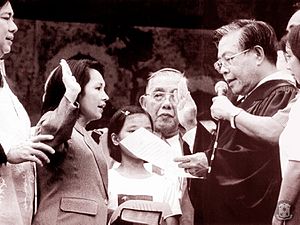
From January 17 to 20, 2001, hundreds of thousands of Filipinos gathered at EDSA. This was the same place as the first People Power Revolution. This movement, called EDSA II, grew stronger. Many groups, including students and politicians, joined in. Officials from the military and police also stopped supporting President Estrada.
On January 20, 2001, Gloria Macapagal-Arroyo was sworn in as president. This happened after President Estrada left Malacañang Palace. Some of Estrada's supporters questioned if Arroyo's presidency was legal. However, the Supreme Court decided that her succession was valid.
A few months later, in April 2001, Estrada was ordered arrested for corruption charges. His supporters protested his arrest. They gathered at the EDSA Shrine and called their protest EDSA III. They demanded Estrada's release and Arroyo's removal. On May 1, 2001, they marched towards Malacañang Palace. Violence broke out when they tried to enter the palace. The military and police were ordered to stop them. Arroyo declared a state of rebellion because of the violence. This was the first major challenge to her presidency.
Key Events During Her Presidency
Oakwood Mutiny
In 2003, a group of soldiers took over the Oakwood Premier Ayala Center in Makati. They called themselves "Bagong Katipuneros." They wanted to show the public about alleged corruption in the government. They believed the president was planning to declare martial law.
2004 Presidential Election
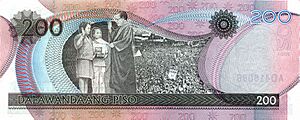
The Philippine Constitution says a president can only serve one term. However, it also allows a successor who served less than four years to run for a full term. Arroyo fit this rule. She first said she would not run in 2004. But in October 2003, she changed her mind. She explained that she wanted to "change society."
Arroyo won the 2004 election by over one million votes. On June 23, 2004, Congress announced her as president. She took her oath of office for a full term in Cebu City on June 30, 2004. This was a break from tradition, as presidents usually take their oath in Luzon.
Election Allegations
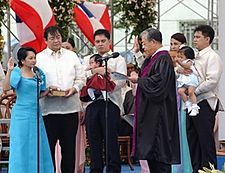
One year after the 2004 elections, there were claims of cheating against Arroyo. In June 2005, a former official claimed to have recordings of Arroyo talking to an election official. These recordings, known as the Hello Garci controversy, suggested that Arroyo ordered the election results to be changed.
This led to large protests against Arroyo. Some of her cabinet members resigned and asked her to do the same. On June 27, 2005, Arroyo admitted to talking to an election official. She called it a "lapse in judgment" but denied influencing the election results. She did not resign despite the pressure. Attempts to remove her from office through impeachment failed in 2005 and 2006.
State of Emergency
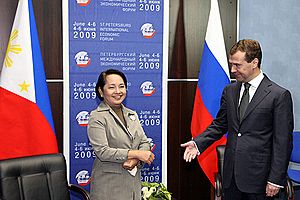
On February 24, 2006, authorities found a plan to take over the government. To deal with this threat, Arroyo declared a state of emergency across the Philippines. She said this was to stop military rebellion and violence. This declaration allowed the government to make arrests without warrants. It also allowed them to take control of private companies. Some senators criticized this, saying it went against people's rights.
The state of emergency lasted about one week. Its goal was to stop violence and illegal rallies. Police and military broke up protests. The state of emergency was lifted on March 3, 2006. The Supreme Court later said the declaration was constitutional. However, it ruled that warrantless arrests and seizing private companies were illegal.
K–12 Education System
During Arroyo's time as president, the process to implement the K–12 education system began. This system aimed to increase basic education from 10 years to 12 years. This change was meant to match global education standards. The K–12 curriculum officially started in 2012, during the administration of her successor, Benigno Aquino III.
Economy During Her Presidency
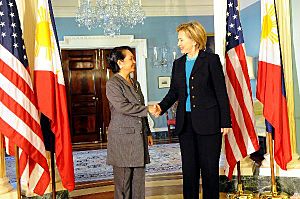
Arroyo, who had degrees in economics, focused on the Philippine economy during her presidency. The economy grew by an average of 4.5% each year. This was faster than the growth under the three presidents before her. In 2007, the economy grew at its fastest rate in three decades.
The Philippine economy avoided shrinking during the 2008 financial crisis. This was because it was not heavily involved in risky international investments. It also relied less on exports. Money sent home by Filipinos working abroad and a growing business process outsourcing industry also helped. Former U.S. President Bill Clinton praised Arroyo for her "tough decisions" that improved the economy. However, despite this growth, poverty rates did not change much because wealth was not shared equally.
A new tax law, called the expanded value added tax (e-VAT), was put in place in November 2005. This law aimed to help the government collect more money and reduce its budget deficit. This tax measure made people more confident in the government's finances. It also helped strengthen the Philippine peso, making it one of Asia's best-performing currencies.
Arroyo also started a policy called "holiday economics." This meant moving holidays to create longer weekends. The goal was to boost local tourism and give families more time together.
Public Opinion
The Social Weather Stations (SWS) group regularly surveyed how satisfied people were with President Arroyo. She started her presidency with a positive rating. However, her rating became negative in 2003. She was the only president to have a negative satisfaction rating in SWS surveys. Her rating improved in 2004, when she won a new term. But it went back to negative later that year and stayed negative. Her lowest rating was -53 in March 2010.
After the Presidency (2010–Present)
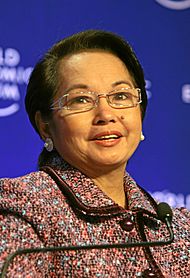
Member of the House of Representatives (2010–2019)
In November 2009, Arroyo announced she would run for a seat in the House of Representatives. She ran for the 2nd district of Pampanga. This made her the second Philippine president to seek a lower office after her presidency ended. She won the election by a large margin in May 2010.
She was re-elected as congresswoman for Pampanga's second district in 2013 and 2016. She ran unopposed in 2016.
Health and Legal Matters
In early 2011, Arroyo was diagnosed with a spinal condition. She had several spine surgeries in July and August 2011.
On November 18, 2011, Arroyo was arrested. This was because of a complaint about election sabotage. She was held at the St. Luke's Medical Center and later at the Veterans Memorial Medical Center. She was released on bail in July 2012.
In October 2012, she was arrested again. This time, it was for misusing state lottery funds. She was kept in hospital arrest due to health issues. In July 2016, the Supreme Court dismissed the corruption charges against her. They found there was not enough evidence. The court ordered her release from the hospital.
Speaker of the House (2018–2019)
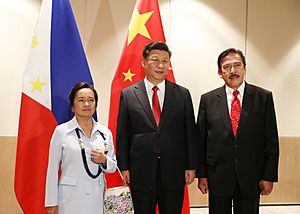
Arroyo was elected as the first female Speaker of the House of Representatives of the Philippines. This happened on July 23, 2018. In August 2018, Arroyo said she would retire from politics after the May 2019 elections.
During her time as Speaker, the House passed a bill to lower the age of criminal responsibility to twelve years old. Her public approval rating as Speaker dropped significantly.
Return to the House of Representatives (2022–Present)
Arroyo came out of retirement to run for the House of Representatives again in 2022. She ran unopposed for the 2nd district of Pampanga. She won and took office on June 30, 2022. She succeeded her son Mikey in this role.
On July 25, 2022, Arroyo was named Senior Deputy Speaker of the House of Representatives. This was under the new Speaker, Martin Romualdez.
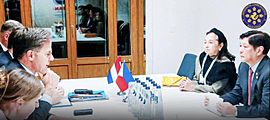
Arroyo has joined President Bongbong Marcos on some of his international trips. These trips included visits to Thailand, Belgium, China, Switzerland, Japan, the United States, and Indonesia. Marcos has even called her his "secret weapon."
On May 17, 2023, she was moved from Senior Deputy Speaker to a regular Deputy Speaker. This was to reduce her workload. Later, on November 7, 2023, she was removed from her Deputy Speaker position. This happened after she did not support a resolution to uphold the House's "dignity, integrity and independence."
Arroyo is running unopposed for re-election as Pampanga's 2nd district representative in 2025.
Honors and Awards
Gloria Macapagal-Arroyo has received many honors and awards. These include:
- Member of the Family Order of Laila Utama from Brunei.
- Grand Cross Special Class of the Order of Merit of Duarte, Sánchez and Mella from the Dominican Republic.
- Grand Cordon of the Order of the Chrysanthemum from Japan.
- Collar of the Order of the Star of Romania from Romania.
- Dame of the Collar of the Order of Isabella the Catholic from Spain.
She has also received several honorary degrees, including:
- Honorary Doctor of Laws from La Trobe University (Australia, 2000).
- Honorary Doctor of Laws from Waseda University (Japan, 2002).
- Honorary Doctor of Laws from Old Dominion University (United States, 2003).
- Honorary Doctor of Laws from Fordham University (2003).
- Honorary Doctor of Humanities from University of San Francisco (United States, 2004).
- Honorary Doctor of Humanities from Mapua Institute of Technology (Philippines, 2004).
- Honorary Doctor of Laws from Kyungsung University (South Korea, 2005).
- Honorary Doctor of Laws from Chulalongkorn University (Thailand).
She has also been recognized by:
- Time magazine's "People Who Mattered" list for 2005.
- Forbes magazine's 100 Most Powerful Women in the World (from 2004 to 2009). She ranked 4th in 2005.
- Member of the Council of Women World Leaders.
- Don Quijote International Award from Spain's King Juan Carlos (2010).
Images for kids
-
Arroyo with U.S. President George W. Bush, May 19, 2003
See also
 In Spanish: Gloria Macapagal Arroyo para niños
In Spanish: Gloria Macapagal Arroyo para niños


